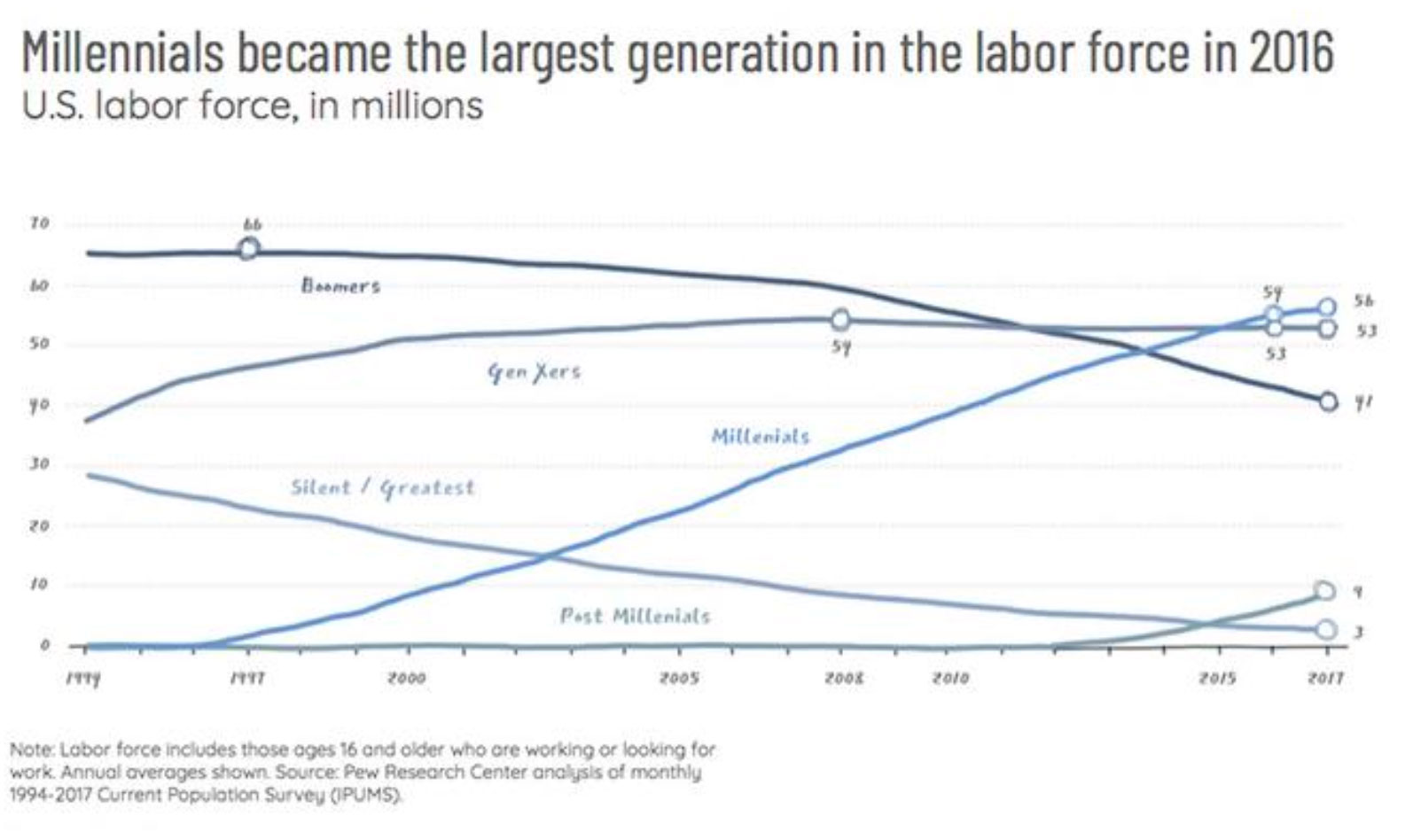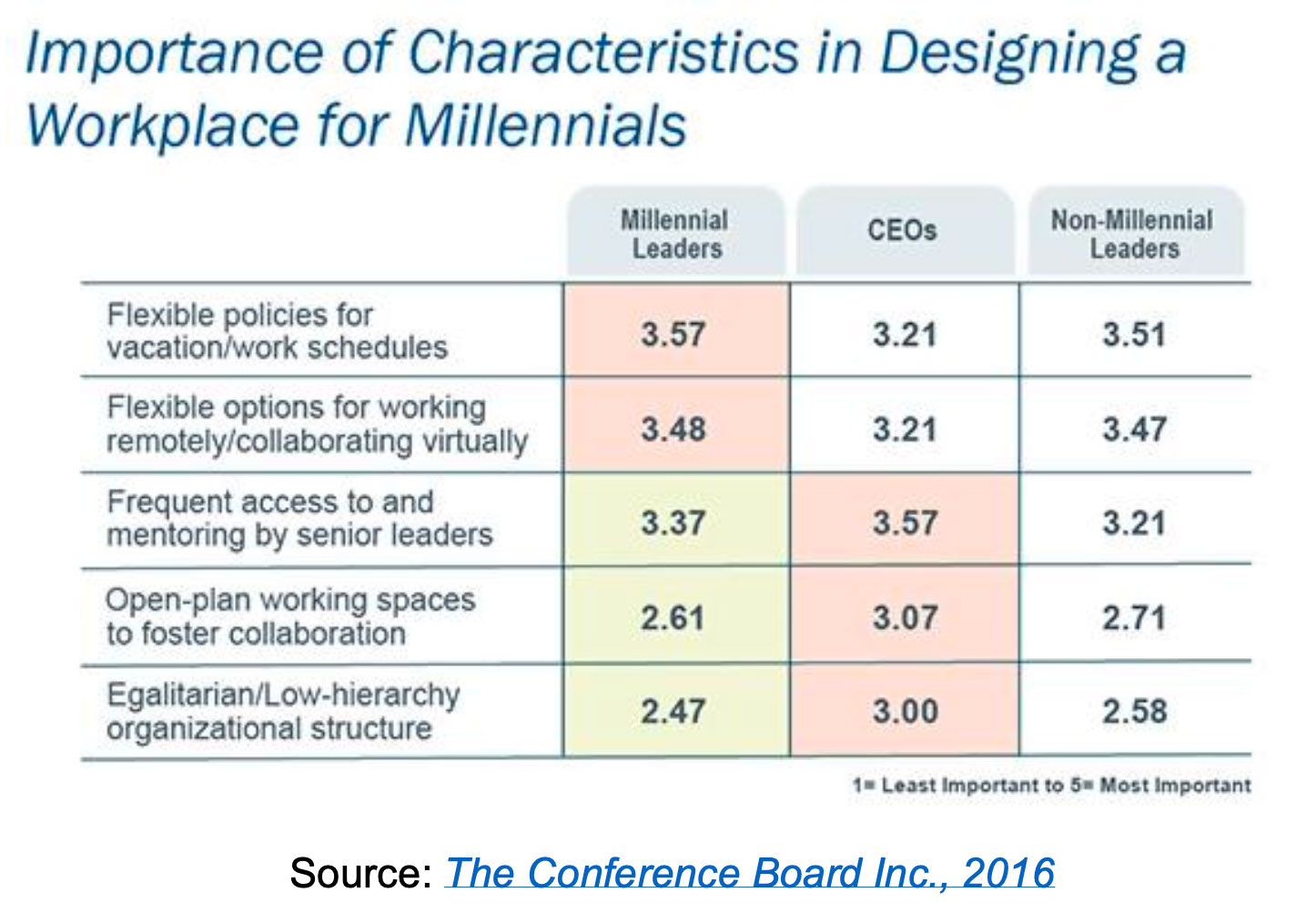The Skyline G Blog: New ideas and perspectives focused on results
by Thuy Sindell, PhD. and Milo Sindell, MS.
Published on September 21, 2019
The topic of millennials and workplace engagement has been the focus of a huge amount of recent literature and research—and for good reason. Millennials, defined by Pew Research Center as those born between 1981 and 1996, became the largest portion of the labor force in the United States earlier this decade, with over 56 million workers; by 2030, they will make up 75% of the US labor force.i

Millennials view their professional careers—including what they value in an employer— very differently than other demographic groups do. While statistics can tell us a lot about traits and characteristics of this large group, one of the defining features of the millennial is the view that they are on an individual, personal journey—one that is going to be very different from the journeys of both their peers and predecessors.ii For this reason, they often view their jobs as a small piece of their overall life, which may contribute to increased rates of disengagement in the workplace.
As reported by Dynamic Signal, millennials:
Clearly, managing millennials effectively presents a huge challenge. But despite these statistics, millennials also show a strong interest in becoming loyal, dedicated, and actively engaged employees when their company’s culture is aligned with their values and career goals. For instance, nearly all (93%) of millennials report that they would stay at a company longer if the company invested in their careers, indicating a strong preference for retaining a job when development opportunities are present.iii
They also value high-trust workplaces and are more than 22x more likely to remain at a position for an extended amount of time when they feel as if the culture is high-trust. In organizations where managers demonstrate sincere interest in the millennial employees, the organization sees an 8x improvement in agility and a 7x increase in innovation.i
Millennials are perhaps the most self-development oriented and motivated generation. In instances where an employer does not offer professional development opportunities and job coaching, millennials will seek this out independently and will spend up to $300 a month on this type of self- improvement iv (if they don’t just find another job that has this benefit).
Simply put, millennials have their sights set on the end goal, and they are willing to work hard to achieve their next professional milestone; employers who demonstrate an active role in assisting these individuals to reach their goals will reap the reward by receiving higher-quality work and greater loyalty. Those who do not will likely be doomed to suffer high turnover rates as their millennial employees leave for better opportunities.
Understanding the unique traits found in millennial employees is often much easier than creating a workplace culture that will appeal to their sense of loyalty—however, it can be done, and oftentimes the most effective way to do this is by motivating, engaging, and inspiring millennials through leadership coaching. When this is done in a wholly engaging way, the result (whether intentional or not) is frequently a culture of very high trust for both the employer and the employee, which makes it easier to provide the other key factors that are important to millennials regarding their workplace. This includes flexible and collaborative workplace options and schedules.

While achieving this flexible, high-trust culture is an ideal outcome, getting there is often another story. There is currently a tremendous gap in current workplace practices and what millennials desire to perform at a higher level. Commonly, once employers initially digest the statistics on what millennials want in the workplace, they make the mistake of implementing a half-hearted professional development program or schedule weekly meetings with no actual developmental goal in mind.
Inevitably, these strategies fail. Another well-known millennial trait is an ability to quickly assess authenticity—and shut down almost immediately when something disingenuous is presented to them. For managers, this means there are no shortcuts. You have got to be wholly engaged, authentic, transparent, and honest if you want to truly inspire millennials and achieve increased productivity, better retention rates, greater creativity, and a company that simply performs better overall.
Leadership coaching is a powerful way to engage and tap the potential of Millennials. Coaching provides a personal, actionable, and tangible way to develop and engage this generation. However, when developing a coaching program for millennials, to maximize results, you need to keep a few things in mind:
Implementing a Millennial Coaching Program
As a result of understanding how to better meet the needs of their millennial employees, many companies are considering or already implementing millennial coaching programs. Successful programs incorporate many elements, including:
1. Identifying and prioritizing which millennials to coach.
2. Communicating the purpose of the coaching and seeking to understand what is meaningful to them. This will help you to understand what motivates them and why it does. This is where it becomes very important to treat everyone as an individual, rather than a homogenous group. After all, millennials embrace their unique qualities and each person will have their own goals and expectations.
3. Identifying levels of goals. This includes organization or company-level goals such as retention, productivity, and impact of coaching to business objectives.
4. Involving their manager in the process. This includes co-identifying coaching objectives and talking about the coaching and development progress in one-on- one meetings.
5. Implementation of a program that will work within the company’s operations and meet the needs of employees and managers.
6. Management of any concerns or complications that may arise, as is typical with any new program.
7. Measurement of progress or results. This can be gauged by assessing impact to individual skills, impact to the job, and organizational impact including retention or business objectives.
8. Reflecting on progress and setting new goals for the coaching program.
9. Repeating this process until you have refined the ability of the managers to coach effectively and you are getting the results you would like to see from your millennial employees.
While these steps provide a basic roadmap for implementing a successful millennial coaching program, it’s important to also understand that no two companies are alike; therefore, no two coaching programs will look exactly alike either. It’s important to allow for your company’s (and employee’s) differences to be acknowledged and design a program that has the greatest likelihood for success given your specific requirements, concerns, culture, and objectives.
Achieving the Benefits of Millennial Coaching
The process for implementing an organization-wide millennial coaching program is a significant but important initiative. Paying attention to millennials, successfully engaging them, and investing in their professional development is one of the most critical endeavors an employer can undertake in relationship to engaging and motivating their workforce. The data overwhelmingly support this:
Reference
i Emmons, M. (n.d.). Key Statistics about millennials in the workplace. Dynamic Signal.
ii Dutton, G. (n.d.). Tips for coaching millennials…and everyone else. Training Magazine.
iii LinkedIn. (2018). 2018 Workforce Learning Report.
iv Schroeder, J. (2018, January 30). Millennials, here’s why you are addicted to self-improvement. Forbes.
v Kassab, M. (n.d.). Forget work perks. Millennial employees value engagement.
Harvard Extension School, Professional Development.
vi McCullough, C. (2019, April 25). The ROI of ExecutiveCoaching.. Rhythm Systems.
Let's explore how we can help you achieve your goals